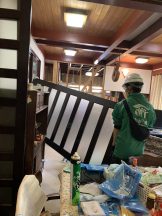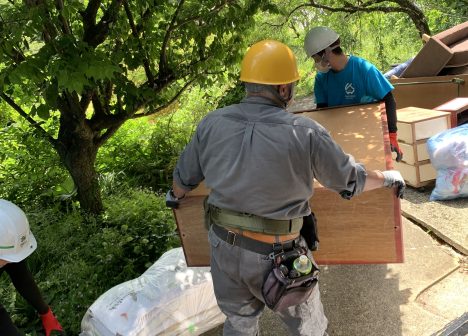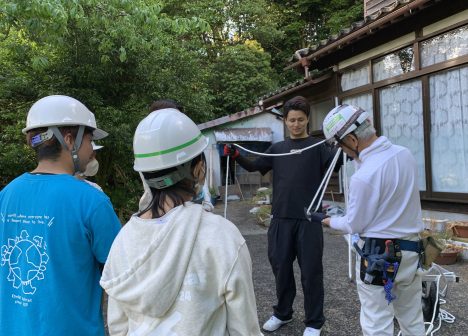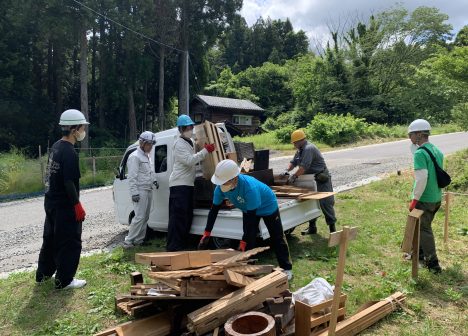In just under a month, half a year will have passed since the Noto Peninsula earthquake that struck on New Year's Day. In Wajima City's Monzen-machi, where Habitat Japan is working to support earthquake victims, evacuees have begun moving away from evacuation shelters and into temporary housing. Despite this major step towards recovery, many of the houses damaged by the quake remain frozen in a state of disrepair. Nevertheless, those affected remain steadfast, taking small steps towards recovery every day. One of these small but important steps is the cleaning of damaged homes.
 The Disaster Relief Volunteer Center, set up by the local Welfare Council, is surveying local needs and working with volunteers and nonprofits both inside and out of Ishikawa prefecture and advancing efforts to clean up household damages. As one of these partner nonprofits, Habitat Japan has received 32 consultations for home cleaning. Requests include cleaning of broken tiling fallen from rooftops, cleaning up dust and messes that have accumulated over months of evacuation, sorting through belongings and disposing of things, and helping move furniture into temporary housing. We've seen many evacuees carefully sorting through precious memories and preparing to let go of their homes.
The Disaster Relief Volunteer Center, set up by the local Welfare Council, is surveying local needs and working with volunteers and nonprofits both inside and out of Ishikawa prefecture and advancing efforts to clean up household damages. As one of these partner nonprofits, Habitat Japan has received 32 consultations for home cleaning. Requests include cleaning of broken tiling fallen from rooftops, cleaning up dust and messes that have accumulated over months of evacuation, sorting through belongings and disposing of things, and helping move furniture into temporary housing. We've seen many evacuees carefully sorting through precious memories and preparing to let go of their homes.
Among Habitat Japan's cleanup efforts, many tasks call for a lot of manpower. Helping us meet these needs, volunteers from Habitat Japan's university campus chapters and adult volunteers with disaster relief experience have stepped up to the plate.
In May, Habitat Japan cleaned 5 households and concurrently held shelf-building workshops with volunteers and residents of temporary housing. On the weekend of May 26th, we asked one adult volunteer from outside of Ishikawa prefecture to come and help with projects where large furniture needed to be dismantled. They happily agreed and rushed to Monzen-machi, driving 8 hours and even bringing a friend. Over the weekend, a total of 10 student volunteers from Kanazawa University's campus chapter "Kindai Habitat" and joined the two adult "super volunteers" and were able to complete the cleaning of 3 households.
One homeowner told us "I wasn't able to make any progress on my own. It was a lifesaver having people who could help move heavy things around!" On the other hand, student volunteers commented "It feels very meaningful to be able to accommodate the needs of disaster victims."
Student volunteer Totaka-san shared with us a revelation they had while working in the disaster area: "I think earthquakes are always one the homeowner's mind. More than convenience or looks, I realized that it's important to think about potential risks in the event of an earthquake around the home. It's something we take for granted in our daily lives."
Beginning with cleaning up damaged homes, Habitat Japan will continue its efforts to support those affected by disaster with the power of student volunteers at their center.
※Habitat Japan's volunteering for the Noto Peninsula is made possible by the Akai Hane “Disaster Relief Volunteer/NPO Activity Support Fund”.



